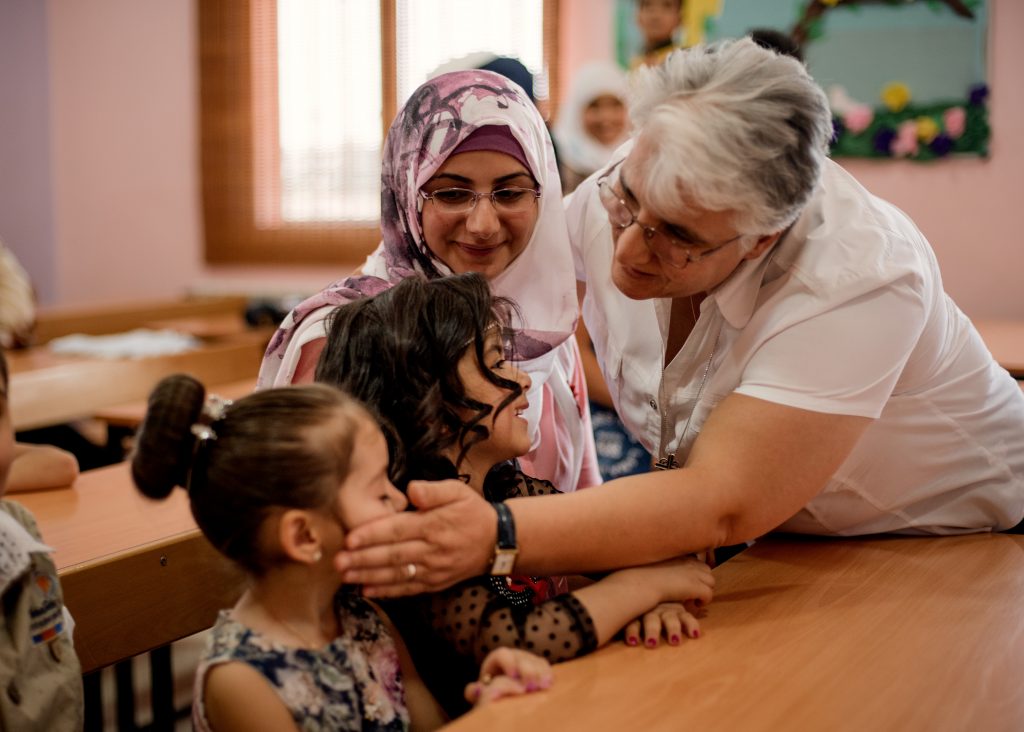From Congo to Colombia, the Catholic Church plays an often unheralded role in peacebuilding. Will the pandemic create new opportunities for Catholic peacebuilders or will their work become more difficult and marginal?
The relationship between armed conflict and health crises is complicated and unpredictable. The pandemic can contribute to peace but also to conflict, especially in already fragile states. Catholic peacebuilders need a response to Christine Bell’s question: “If this unpredictability is, however, itself predictable — a “known unknown” — can a “smart” response be put in place?” In this current context of uncertainty Catholic peacebuilders can respond smartly to the pandemic in the following ways: 1) by providing conflict-sensitive responses; 2) by overcoming new challenges in facilitating peace processes; and, 3) amidst a dearth of global leadership, by offering an alternative vision of integral human development, solidarity, and cooperative security.
Conflict-sensitive responses to the pandemic
In its guidance on the pandemic and peacebuilding, Catholic Relief Services (CRS) points out that “the extent to which healthy social ties can be maintained and adapted during this crisis period can determine the ability of fragile and conflict affected states and communities to shift into the recovery phase without increased conflict, violence and inequity.” Government lockdowns and humanitarian responses to the pandemic must be judged according to their impact on social trust and conflict. Catholic leaders rightly oppose efforts of governments to use the pandemic as an excuse to normalize emergency measures or solidify undemocratic practices. In the Philippines, President Rodrigo Duterte has used the pandemic as a pretext to incite violence against his critics, while pressing for a new anti-terrorism bill that some have justified, in part, as a response to increased risk of terrorism during the pandemic. Catholic leaders opposed the bill because it could “further reinforce tyranny and totalitarianism,” and diverts attention from the pandemic.
Conflict sensitivity involves assessing systemic injustices exacerbated by the pandemic.
In many countries, Catholic agencies are well placed to play a leading role in conflict-sensitive responses because they provide a substantial percentage of health care, social services, and humanitarian aid. CRS highlights key elements of a conflict-sensitive approach. Conflict sensitivity involves assessing systemic injustices exacerbated by the pandemic, as well as changing social-economic-political dynamics that might contribute to exclusion and scapegoating, erode social trust, and engender conflict.
Conflict-sensitive programs should be done in an equitable, non-discriminatory, and transparent way that prioritizes those most at risk, such as marginalized minorities, the displaced, and the poor. Programs must also be gender sensitive, since women and girls are often most adversely affected by communal conflicts. They face an increased likelihood of experiencing “trickle down” increases in domestic violence. Not least, women are most likely to work in sectors most affected by the pandemic.
Finally, programs should be designed and operated in ways that prioritize broad participation by diverse groups and promote collaboration across communal divides. During the pandemic, conflict-sensitive programs in places like Mindanao are linking their conflict and coronavirus analyses of local dynamics, and are experimenting with online training and dialogue in their efforts to continue to engage communities.
Facilitating peace processes
The Colombian peace process illustrates “the predictability of unpredictability” in the nexus between the pandemic and peace, and the need for smart responses that are comprehensive and integrated.
On June 16, Notre Dame’s Kroc Institute for International Peace Studies, the official monitor of implementation of the 2016 peace accord with FARC, concluded that the peace process is at “a crucial point of transformation.” The report finds that twenty-five percent of the accord’s stipulations (mostly short-term) have been fully implemented and another fifteen percent are expected to be completed on time; most of the provisions that remain to be implemented require mid- and long-term efforts at structural change. In a separate statement about the impact of the pandemic on the process, the Kroc Institute noted that continued implementation of the accord “will help to create more resilient and accountable governance in Colombia, which could help mitigate the impacts of the pandemic.”
At the same time, the pandemic is impeding implementation of the accord. Armed groups and criminal elements take advantage of the health crisis to thwart the peace process. Consultations and legislative processes necessary to implement the accord have been delayed, and efforts to reincorporate ex-combatants have slowed. National and international funding for implementation is also at risk as funds are diverted to address the pandemic. The national peace council, headed by Msgr. Hector Fabio Henao, director of the Colombian bishops’ national social pastoral office, is helping to ensure broad engagement in the peace process. But the pandemic is impeding the formation of similar peace councils in areas formerly controlled by FARC. The national truth commission, headed by Fr. Francisco de Roux, SJ, must be careful that victims of the pandemic do not fall into a competition with victims of violence for attention and aid.
Meanwhile, the Colombian bishops have facilitated peace negotiations between the government and the largest remaining guerrilla group, the ELN. After Pope Francis endorsed UN Secretary General Antonio Guterres’ call for global ceasefires to help combat the pandemic, the ELN announced a humanitarian ceasefire. Despite appeals from the bishops, who insist peace is a prerequisite for dealing with the pandemic, the ELN ended the ceasefire at the end of April, just as the pandemic worsened.
Progress on peace and the pandemic go hand in hand. But what about sustainable development? Unfortunately, despite being one of the world’s most comprehensive (or integral) peace accords, the Colombia accord’s failure to address mining reflects a missed opportunity to connect integral peace, ecology and development. The Colombian government is relying on a massive expansion of mining in the Amazon to help deliver the peace dividend. While the economic downturn could delay that expansion, the pandemic could also be used as an excuse by the government and the mining companies to circumvent normal regulatory processes, in order to press forward with exploitation of the Amazon. The Colombian government, for example, plans to use online community consultations about mining projects and public hearings on environmental licensing, even though most people in the impacted communities lack internet access.
Mining poses a serious challenge for Catholic peacebuilders in Colombia. A survey of dioceses in Colombia shows the variety of ways in which the Church has responded: opposing some mining projects; urging that others proceed only with appropriate protections for indigenous land claims, worker rights, and the environment; or not getting involved in a matter some church leaders consider beyond their competence.
In a forthcoming article, Msgr. Hector Fabio Henao and Sandra Polonia-Reyes suggest that pastoral accompaniment and pastoral dialogues are ways of being church with an “Amazonian face.” This approach insists that genuine and inclusive dialogue, especially including the marginalized, is essential for resolving disputes over mining as well as for deeper reconciliation. This approach also seeks to change the paradigm by framing the mining issue not just in terms of economic development, rights of workers and communities, and environmental and conflict impacts, as important as these are. It goes deeper, rejecting a utilitarian or solely rights-based approach to the environment, in favor of a theology of care for creation. A respect for the inextricability of identity, culture and territory is at the core of this theology, which assumes and advocates for an integral approach to human development, ecology and peace.
A vision of integral human development and cooperative security
When historians write about this global pandemic, they will note a deficit in global leadership and lack of a coordinated global response. They will point to the UN Security Council’s failure to declare the pandemic a threat to international peace, and to take the lead in addressing the obvious structural injustices and institutional failings it exposed. This and other failures, the historians will conclude, had a lot to do with the fact that key member states that were the least successful in controlling the pandemic had authoritarian, demagogic, nationalist, and/or aggressive leaders.
Perhaps “will” is premature. There is still time to keep the post-pandemic return to “normal” from looking like the pre-pandemic status quo. The Catholic community alone is not capable of filling the current void in global political leadership. But, drawing on Catholic social teaching and using its institutional networks and people power, it can offer a vision and call to action to transform this crisis into an opportunity for the systemic change needed for a more just and peaceful world.
Now is the time to develop bold plans for advocacy and action so the Catholic community will be in a position to help build a more just and peaceful post-pandemic world.
In a post-pandemic world where the gulf between zones of peace, prosperity and environmental justice and zones of conflict, deprivation and ecological devastation is likely to be ever less bridgeable, an integral and integrated approach to peace, development and ecology will be all the more necessary. In a post-pandemic world seeking to recover from mass starvation, unprecedented refugee flows, and a proliferation of failing and failed states, human security will have to take priority over narrow notions of national security. In a world recovering from the worst global economic downturn since the Great Depression, the focus will have to be on integral human development of the whole person and whole communities, not just markets and GDP. And all of that will require acknowledging the basic fact that we live in a complex, interdependent world that cannot function without sustained efforts to deepen bonds of solidarity, the glue that allows us to build more effective and just structures of cooperative security.
Conclusion
A smart—that is, an integral and integrated— response to the pandemic’s existential threat and unpredictability would be for Catholic actors at all levels to begin to prepare now for the day after the pandemic. Now is the time to develop bold and imaginative plans for advocacy and action so that the Catholic community will be in a position to help build a more just and peaceful post-pandemic world.
Such plans would prioritize refocusing on mission – the whole mission of the Church. That mission puts the Church on the front lines in addressing humanitarian needs in ways that promote social trust and cohesion. The whole, integrated mission of the Church, further, builds on its extensive pastoral presence to facilitate comprehensive and integrated approaches to peace processes. Not least, the Church offers a vision for human flourishing that is bold enough to advance a new paradigm for a post-pandemic world, despite the dearth of government and other leaders who are committed to protecting the dignity of all the people.
Gerard Powers is director of Catholic peacebuilding studies for the Kroc Institute for International Peace Studies at the University of Notre Dame. He is also coordinator of the Catholic Peacebuilding Network, which links twenty-one bishops’ conferences, Catholic development agencies, universities, and independent peace organizations in an effort to enhance the study and practice of conflict prevention, conflict management, and post-conflict reconciliation in war-torn areas.
This article is part of a series of blog posts published by the Keough School of Global Affairs. Dignity and Development provides in-depth analysis of global challenges through the lens of integral human development.
Photo: Ismail Ferdous/CRS



